Do you recall the hubbub when the Academy Awards decided not to broadcast some of the very important awards? As if some people didn’t care? Well, that didn’t go so well, since some of those awards, although specialized, were very important. And interesting. You wanted to see them, but you couldn’t. Just to save a little time.
I’m here to solve that problem.
We’ve got a specialized list that other stores may choose not to name, let alone broadcast.
Ladies and gentleman, we present to you our short list of the best books about race, racism, multi-ethnic ministry, and related concerns of 2018. Sorry it’s running a bit late and long, not unlike the more famous award show.
We had hoped to run this in January and for a variety of reasons that mostly go under the heading of “too darn busy with other essential stuff” — from prepping for Jubilee to needing to list Lent books in March to getting a tooth pulled — we got delayed.
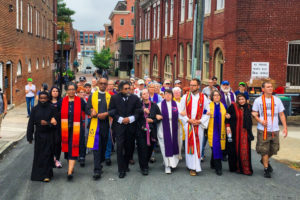 2018 saw a good number of very important, interesting, and useful books on the themes of racial injustice, racism, Biblical justice, Christian reconciliation, urban ministry issues and the like. From moving memoirs to incisive critiques to books offering missional vision and programmatic application, we have seen so many new titles on this topic that we wanted to thank the publishers (and authors) for their commitments to doing this kind of risky publishing. (Risky, because, of course, often these books languish on the shelves. In fact, I’m told many of our fellow-Christian booksellers simply don’t carry many of these sorts.) Many faith-based publishers have done good stuff and just when one is tempted to think that we hardly need more books on this vexing topic, these great reads prove otherwise. We hope you vote with your dollars and purchase some, sending the message to the publishers that we indeed need these kinds of resources.
2018 saw a good number of very important, interesting, and useful books on the themes of racial injustice, racism, Biblical justice, Christian reconciliation, urban ministry issues and the like. From moving memoirs to incisive critiques to books offering missional vision and programmatic application, we have seen so many new titles on this topic that we wanted to thank the publishers (and authors) for their commitments to doing this kind of risky publishing. (Risky, because, of course, often these books languish on the shelves. In fact, I’m told many of our fellow-Christian booksellers simply don’t carry many of these sorts.) Many faith-based publishers have done good stuff and just when one is tempted to think that we hardly need more books on this vexing topic, these great reads prove otherwise. We hope you vote with your dollars and purchase some, sending the message to the publishers that we indeed need these kinds of resources.
Here then are some that deserve special acknowledgment, that we recommend, and that we trust you will be glad to know about. Although a bit late, here are some notable books on race from 2018. I will try to keep my remarks brief, but know that we applaud these authors and believe their work is urgent.
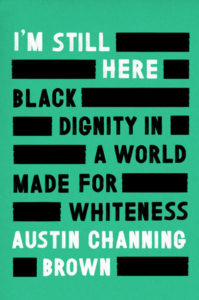 I’m Still Here: Black Dignity in a World Made for Whiteness Austin Channing Brown (Convergent) $25.00 This has been our big selling book on the topic since it came out in the Spring of 2018. We promoted it early on and a number of book clubs, readers, churches, ministries and organizations of used it. Simply put, I’m Still Here is one of the very Best Books of 2018 and we highly recommend this moving memoir of a young Christian woman who has particularly been involved in white middle-class evangelicalism. She tells us what it has been like for her and I am sure many will enjoy, be moved by, be horrified by, and be changed by her brave telling of her own story. Very highly recommended.
I’m Still Here: Black Dignity in a World Made for Whiteness Austin Channing Brown (Convergent) $25.00 This has been our big selling book on the topic since it came out in the Spring of 2018. We promoted it early on and a number of book clubs, readers, churches, ministries and organizations of used it. Simply put, I’m Still Here is one of the very Best Books of 2018 and we highly recommend this moving memoir of a young Christian woman who has particularly been involved in white middle-class evangelicalism. She tells us what it has been like for her and I am sure many will enjoy, be moved by, be horrified by, and be changed by her brave telling of her own story. Very highly recommended.
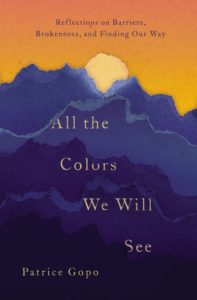 All the Colors We Will See Patrice Gopo (W Publishing Groups) $16.99 We’ve highlighted this several times at BookNotes, and we want to celebrate it again as one of the more interesting books you will find from this past year. What a memoir — a black woman raised in Alaska who then moves to the deep South. There’s all kinds of cross-cultural fiascos, here — some a bit light-hearted, some beautifully and tenderly told, and some horrific. This moves around the issues of race and culture and the questions of how being different effects us. Gopo is a smart, smart woman, a good writer, and she here tells of her marriage and her church and how we think of beauty and brokenness and all kinds of good, good stuff. A lovely blurb on the back from writer Bret Lott reminds us of the high quality of this enjoyable, fine book.
All the Colors We Will See Patrice Gopo (W Publishing Groups) $16.99 We’ve highlighted this several times at BookNotes, and we want to celebrate it again as one of the more interesting books you will find from this past year. What a memoir — a black woman raised in Alaska who then moves to the deep South. There’s all kinds of cross-cultural fiascos, here — some a bit light-hearted, some beautifully and tenderly told, and some horrific. This moves around the issues of race and culture and the questions of how being different effects us. Gopo is a smart, smart woman, a good writer, and she here tells of her marriage and her church and how we think of beauty and brokenness and all kinds of good, good stuff. A lovely blurb on the back from writer Bret Lott reminds us of the high quality of this enjoyable, fine book.
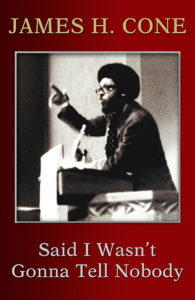 Said I Wasn’t Gonna Tell Nobody James H. Cone (Orbis Books) $28.00 The year of our Lord 2018 saw the passing of brother James Cone, perhaps one of the most important theologians of the late 20th century. His previous, recent book, The Cross and the Lynching Tree continues to sell and transform readers by is powerful prose and insightful, prophetic critique. One need not agree with Cone’s black liberation theology — and there are important books which respond critically to his corpus — to realize how important he was. This book (with a wonderfully poetic foreword by Cornel West — who else?) is the story of his life, his own poetic autobiography that he said he didn’t want to write. But many, many intimate friends and distant readers are glad he did.
Said I Wasn’t Gonna Tell Nobody James H. Cone (Orbis Books) $28.00 The year of our Lord 2018 saw the passing of brother James Cone, perhaps one of the most important theologians of the late 20th century. His previous, recent book, The Cross and the Lynching Tree continues to sell and transform readers by is powerful prose and insightful, prophetic critique. One need not agree with Cone’s black liberation theology — and there are important books which respond critically to his corpus — to realize how important he was. This book (with a wonderfully poetic foreword by Cornel West — who else?) is the story of his life, his own poetic autobiography that he said he didn’t want to write. But many, many intimate friends and distant readers are glad he did.
It is, as Harold Recinos of Perkins School of Theology says,
A must-read for everyone interested in discerning how to live awake in the gospel while inspiring the voice of the oppressed.
There are remarkable blurbs on the back of this volume — from womanist Emilie M. Townes of Vanderbilt to Willie James Jennings of Yale to Cheryle Townsend Gilkes of Colby College. Cone clearly has left his mark in the academy, in the progressive mainline church, and in the historic black church. He was, doubtlessly, the “genius architect of black liberation theology” and some have called this “his final masterpiece.” It is, of course, unrelenting in its observations and resistance to white injustices and white supremacy. But it is also revealing and vulnerable, an example of how theology matters and what it was like being a liberationist scholar in the too often staid scholarly circles of the mainline academy.
Question: is the title drawn from the gospel song, or maybe the old Sam and Dave hit? Read it to find out!
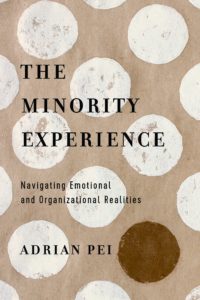 The Minority Experience: Navigating Emotional and Organizational Realities Adrian Pei (IVP) $17.00 I so, so appreciate the above three books that are memoirs of those sharing their own story, using narrative to help folks understand better the life of a person of color in our time and place. Regardless of one’s own ethnicity and race, these books are captivating and often enjoyable to read, joining the writer on her or his journey, hearing them narrate their own life and times. This important book from 2018 tells some of the author’s story, but it is also research based and loaded with good, helpful, valuable information. As Kathy Khang writes, “The Minority Experience is a helpful addition for organizational leaders to grow and deepen their cultural intelligence to include race and ethnicity.”
The Minority Experience: Navigating Emotional and Organizational Realities Adrian Pei (IVP) $17.00 I so, so appreciate the above three books that are memoirs of those sharing their own story, using narrative to help folks understand better the life of a person of color in our time and place. Regardless of one’s own ethnicity and race, these books are captivating and often enjoyable to read, joining the writer on her or his journey, hearing them narrate their own life and times. This important book from 2018 tells some of the author’s story, but it is also research based and loaded with good, helpful, valuable information. As Kathy Khang writes, “The Minority Experience is a helpful addition for organizational leaders to grow and deepen their cultural intelligence to include race and ethnicity.”
Yet, it is more than just a good resource helping leaders understand race, but it helps (most often white) leaders understand the experiences (and, necessarily, the feelings) of minority staff and members.
Here is what it says on the back:
If you’re the only person from your ethnic or cultural background in your organization or team, you probably know what it’s like to be misunderstood or marginalized. Organizational consultant Adrian Pei describes key challenges ethnic minorities face in majority culture organizations. He unpacks how historical forces shape contemporary realities, and what we need to know in order to wrk together fruitfully. If you’re a cultural minority employee or if you’re a majority culture supervisor of people from other backgrounds, discover here how all can flourish.
Isn’t it beautiful to realize such weighty but helpful books are being released by solid, faith-based publishers, knowing that God cares (and the Bible addresses) these very topics? Kudos to IVP, once again, for being the leading publisher consistently offering top-shelf books on this topic.
Listen to what Andy Crouch says about Adrian Pei and The Minority Experience:
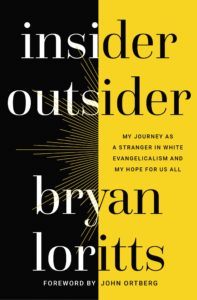 Inside Outsider: My Journey As A Stranger in White Evangelicalism and My Hope for All of Us Bryan Loritts (Zondervan) $17.99 I hope you know Bryan Lorritts — he’s a good, good guy, a fabulous preacher, and a perfect leader to bridge the divide between whites and black, especially between those inside or outside of the evangelical subculture. As a graduate of what is now called Cairne University — previously Philadelphia Bible College — he knows white evangelicalism well. One of my own great heroes, Tom Skinner, from New Jersey, was influential in the Loritts family; Skinner, too, was a great example of a black preacher and evangelist who travelled often in white circles. I met Skinner often in college as he spoke and taught in CCO circles or with his friend Tony Campolo. With a great foreword by John Ortberg, Inside Outsider will be appealing to many of our Hearts & Minds customers since we know many trust and respect Ortberg.
Inside Outsider: My Journey As A Stranger in White Evangelicalism and My Hope for All of Us Bryan Loritts (Zondervan) $17.99 I hope you know Bryan Lorritts — he’s a good, good guy, a fabulous preacher, and a perfect leader to bridge the divide between whites and black, especially between those inside or outside of the evangelical subculture. As a graduate of what is now called Cairne University — previously Philadelphia Bible College — he knows white evangelicalism well. One of my own great heroes, Tom Skinner, from New Jersey, was influential in the Loritts family; Skinner, too, was a great example of a black preacher and evangelist who travelled often in white circles. I met Skinner often in college as he spoke and taught in CCO circles or with his friend Tony Campolo. With a great foreword by John Ortberg, Inside Outsider will be appealing to many of our Hearts & Minds customers since we know many trust and respect Ortberg.As he notes, “It’s tiring to always play the part of a stranger. We long for home.” Ahh, yes, but does that mean just being among those that look just like us? Can “home” be a place where even outsiders feel like insiders? Can those who are people of color in predominantly white evangelical spaces ever be comfortable? Can we honor the fact that theology and spiritual formation always is influenced by our own cultural lenses and outlooks and that is never neutral?
He likens some white folks to those Americans who travel abroad but can’t imagine that they have an accent. We are all too unaware of our ethnic theological accents that we carry.
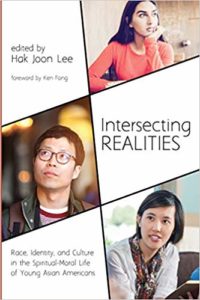 Intersecting Realities: Race, Identity, and Culture in the Spiritual-Moral Life of Young Asian Americans edited by Hak Joon Lee (Wipf & Stock) $23.00 What a fascinating glimpse into Asian American young adults and how complexities of race and ethnicity (and nationality) influences this important rising cohort. There is more pain within Asian American communities than many realize and much hard stuff to deal with as youth transition into the young adult world. This book is a must, therefore, for anyone working campus ministry or who is keeping current with the recent batch of books about contemporary generations and young adult outreach.
Intersecting Realities: Race, Identity, and Culture in the Spiritual-Moral Life of Young Asian Americans edited by Hak Joon Lee (Wipf & Stock) $23.00 What a fascinating glimpse into Asian American young adults and how complexities of race and ethnicity (and nationality) influences this important rising cohort. There is more pain within Asian American communities than many realize and much hard stuff to deal with as youth transition into the young adult world. This book is a must, therefore, for anyone working campus ministry or who is keeping current with the recent batch of books about contemporary generations and young adult outreach.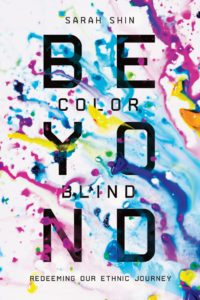 Beyond Colorblind: Redeeming Our Ethnic Journey Sarah Shin (IVP) $16.00 Of course, racism is a sin and our divisions and prejudices are hurtful, but — let’s face it — pretending we are all the same, or saying we “don’t see color” is just dumb. Of course we see color and gender and other things that make us, and our neighbors, who we are. To try not to is, frankly, disrespectful and not a helpful thing to say to a person of color. Some of what we see could be considered wounds, even, but (again, we should say this over and over) race and ethnicity and skin tone and the possibility of unique cultural practices are not part of what theologians call “the fall” (and sin) but are part of the good, created order. Again, our colors are what God intended. What God calls “very good” in Genesis 1 reverberates down to the realities of our current world, so we can say that color and race and ethnicities are good gifts from a creative God. Racism may be wrong in countless ways, but race, as such, is good.
Beyond Colorblind: Redeeming Our Ethnic Journey Sarah Shin (IVP) $16.00 Of course, racism is a sin and our divisions and prejudices are hurtful, but — let’s face it — pretending we are all the same, or saying we “don’t see color” is just dumb. Of course we see color and gender and other things that make us, and our neighbors, who we are. To try not to is, frankly, disrespectful and not a helpful thing to say to a person of color. Some of what we see could be considered wounds, even, but (again, we should say this over and over) race and ethnicity and skin tone and the possibility of unique cultural practices are not part of what theologians call “the fall” (and sin) but are part of the good, created order. Again, our colors are what God intended. What God calls “very good” in Genesis 1 reverberates down to the realities of our current world, so we can say that color and race and ethnicities are good gifts from a creative God. Racism may be wrong in countless ways, but race, as such, is good.
So how do we steward well our own unique make-up? How can we honor and celebrate our ethnic journey in helpful and life-giving ways without making an idol of our own unique make-up? This is a gem of a book, inviting us to consider we need a strong sense of ethnic identity and how God can redeem and use our racial histories. Yes, there’s some hard stuff in here — we cannot deny that in a fallen world our ethnic journeys indeed need redeeming. But we can steward these gifts well, and Sarah Shin is a fabulous resource specialist to help us.
Sarah Shin is a speaker and trainer in evangelism, by the way, for InterVarsity Christian Fellowship who tries so very hard with so much good intention to get this stuff right. Ms. Shin is impressive to say the least — she has a master’s degree in theology from Gordon Conwell and another master’s in city planning and development from MIT. She and her husband live in Cambridge, Massachusetts.
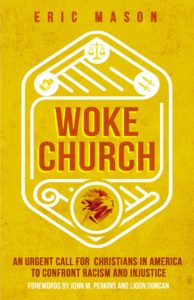 Woke Church: An Urgent Call for Christians in America to Confront Racism and Injustice Eric Mason (Moody Press) $14.99 Oh my, Reverend Mason is a passionate, compelling, voice from urban Philly — we’ve met him at Jubilee at time or two — and while he is non-compromising in his call for the church to become woke, he is regularly engaged with theologically conventional white evangelicals. One could hardly ask for a more dramatic and fun speaker, rooted in contemporary culture and experience and yet fully reliable in conventional theological, Biblical truth. In fact, the very white, seriously Reformed, Dr. Ligon Duncan — who says he’s about “the least ‘woke’ person you could meet” — wrote one of the two forewords (the other is by John Perkins.) This is an urgent call to learn, to care, to rise up. It’s nicely designed, an engaging read. Good stuff. Highly recommended.
Woke Church: An Urgent Call for Christians in America to Confront Racism and Injustice Eric Mason (Moody Press) $14.99 Oh my, Reverend Mason is a passionate, compelling, voice from urban Philly — we’ve met him at Jubilee at time or two — and while he is non-compromising in his call for the church to become woke, he is regularly engaged with theologically conventional white evangelicals. One could hardly ask for a more dramatic and fun speaker, rooted in contemporary culture and experience and yet fully reliable in conventional theological, Biblical truth. In fact, the very white, seriously Reformed, Dr. Ligon Duncan — who says he’s about “the least ‘woke’ person you could meet” — wrote one of the two forewords (the other is by John Perkins.) This is an urgent call to learn, to care, to rise up. It’s nicely designed, an engaging read. Good stuff. Highly recommended.
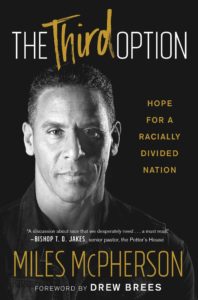 The Third Option: Hope for a Racially Divided Nation Miles McPherson (Howard Books) $26.00 I’m not going to lie — I like Miles McPherson, an upbeat former pro football player turned pastor but I may not have chosen to read this if I wasn’t on a committee considering a book award and was asked to consider it since it has was on a short list. Rev. McPherson is a dynamic communicator, a clear writer, a conventionally inspirational evangelical conference speaker, and as a black man, he surely has sensitivities to racial injustice and social issues. But I didn’t realize he’d have that much to say, or that much beyond “God loves us so in Christ’s Kingdom we should all get along.” We need more profound analysis, better theological depth, and more anguished and passionate writing.
The Third Option: Hope for a Racially Divided Nation Miles McPherson (Howard Books) $26.00 I’m not going to lie — I like Miles McPherson, an upbeat former pro football player turned pastor but I may not have chosen to read this if I wasn’t on a committee considering a book award and was asked to consider it since it has was on a short list. Rev. McPherson is a dynamic communicator, a clear writer, a conventionally inspirational evangelical conference speaker, and as a black man, he surely has sensitivities to racial injustice and social issues. But I didn’t realize he’d have that much to say, or that much beyond “God loves us so in Christ’s Kingdom we should all get along.” We need more profound analysis, better theological depth, and more anguished and passionate writing.
And you know what? I couldn’t put this easy-to-read, inspiring, evangelical volume down! It was compelling with lots of stories, lots of Bible, lots of insight, plain-spoken, with a light touch, calling us to follow Christ as His agents of reconciliation. I’m not sure why Rick Warren calls it “a landmark book” but it is compelling and enjoyable and informative and maybe just what some need for a gentle, kind, and eye-opening call to be a “third way.”
What does this inspiring pastor mean by a “third way”? He is concerned, obviously, about racial hatred and prejudices but he thinks that we continue to be stuck in an “us vs them” approach. That’s it, one is either with us or with them. A Christian third way is based on honor and outreach. He preaches it really well.
McPherson has played in the NFL and has seen a lot. He is himself mixed race, so even as he was growing up he was teased and rejected by both the black and white communities. He knows what he’s talking about and this is a gentle, sensible, spiritually clear resource.
As Sam Rodriquez (President of the National Hispanic Church Leadership Conference) puts it:
The Third Option will not just inspire you; it will equip you with the necessary tools to advance facilitate, and usher in a spirit of unity. You will not just be blessed, you will be transformed.
By the way, there’s a nice foreword by Drew Brees.
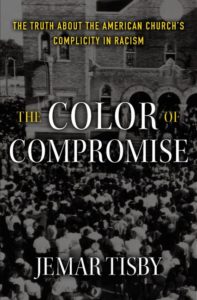 The Color of Compromise: The Truth about the American Church’s Complicity in Racism Jemar Tisby (Zondervan) $21.99 Although this publisher has not done many books on this topic, this one is simply extraordinary and, in part due to his own energetic social media presence and no-compromise outspoken teaching, it is perhaps the book of 2019 in this field. This is important. If you haven’t ordered it from us yet, you should seriously consider it.
The Color of Compromise: The Truth about the American Church’s Complicity in Racism Jemar Tisby (Zondervan) $21.99 Although this publisher has not done many books on this topic, this one is simply extraordinary and, in part due to his own energetic social media presence and no-compromise outspoken teaching, it is perhaps the book of 2019 in this field. This is important. If you haven’t ordered it from us yet, you should seriously consider it.
The Color of Compromise is certainly one of the most talked about books on a Christian publishing house in years. While it officially has a 2019 copyright, I had an early edition so I read most of it in 2018 and we were taking pre-orders in 2018 so forgive me for stretching the rules just a bit here and honoring this very, very important, very informative work.
Of course there have been many other books that tell the story of racial oppression and the vivid injustices faced by African people who were enslaved and by black Americans even after emancipation and into the Antebellum Era. Who doesn’t know at least a little about the rise of the KKK and Jim Crow and lynchings and the vile treatment of those working against segregation and voter rights, about voter suppression and the implicit bias and institutional racism in everything from banking to policing to education? Sure it is an ugly bit of history, but we need books like to inform those who don’t know and to remind those of us who do. Few have told it so well, with an eye to how the church was complicity and compromised. As the publisher summarizes: The Color of Compromise:
…reveals the chilling connection between the church and racism throughout American history. A survey of the ways Christians of the past have reinforced theories of racial superiority and inferiority provides motivation for a series of bold actions believers must take to forge a future of equity and justice.
Mr. Tisby is is a lively and thoughtful educator and we are very, very glad he wrote this book. He graduated from the University of Notre Dame, has an MDiv from Reformed Theological Seminary (in Jackson, MS) and is the president of The Witness, a Black Christian Collective where he writes about race, religion, politics, and culture. He is also the co-host of the Pass The Mic podcast. He has spoken nation-wide at conferences and his writing has been featured in the Washington Post, CNN, and Vox. He is a PhD candidate in History at the University of Mississippi studying race, religion, and social movements in the twentieth century.
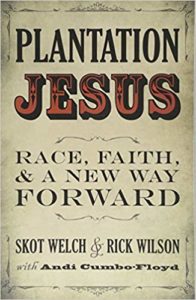 Plantation Jesus: Race, Faith, & A New Way Forward Skot Welch & Rick Wilson with Andi Cumbo-Floyd (Herald Press) $16.99 This, friends, is surely one of the fine and helpful titles of 2018 and is one more example of the many, many good books being done on race and racism. And, further, it’s a great example of the wise and deeply Christian insights offered by Herald Press, a Mennonite-related publishing house. We carry all their new releases and recommend that you pay attention when they do new books.
Plantation Jesus: Race, Faith, & A New Way Forward Skot Welch & Rick Wilson with Andi Cumbo-Floyd (Herald Press) $16.99 This, friends, is surely one of the fine and helpful titles of 2018 and is one more example of the many, many good books being done on race and racism. And, further, it’s a great example of the wise and deeply Christian insights offered by Herald Press, a Mennonite-related publishing house. We carry all their new releases and recommend that you pay attention when they do new books.
Plantation Jesus itself has a back story that may make you want to be a part of this — buying a few, maybe, and spreading the word. Rick Wilson (a white guy) died during the writing of the book and his friend (and former podcast partner, Skot Welch) finished it, in part as a way to honor Wilson’s brave and relentless work as a racially-sensitive journalist. But Rick really was the better writer of the pair, so Skot employed old Hearts & Minds pal, Andi Cumbo-Floyd (who herself has written a striking memoir about race and the enslaving of people called The Slaves Have Names: Ancestors of My Home) to join in helping polish the manuscript started by Skot and the late Rick Wilson. The result, as the great Patricia Raybon (author of My First White Friend) puts it, is “a healing triumph.”
Get that: a healing triumph!
Of course for it to be truly healing it has to be true. That is, it has to tell the hard historical story of white supremacy with candor and grit, and it does, with what one reviewer called “fearless urgency,” As Rachel Held Evans says, it is a “must read” because it is “raw, unflinching, and yet ultimately hopeful.”
“Plantation Jesus”, as they call him, is a (false) god who legitimized slavery. This Jesus wasn’t bothered by Jim Crow. By portrayals of Jesus as white, a god who is “comfortable with bigotry, and an idol that distorts the message of the real Savior.”
Can anything be more important than discovering and knowing the real Jesus? Can a church shaped by an inadequate or even wrong and hurtful Jesus ever find real renewal? For the sake of our churches, for the sake of our witness and work in the world, for the sake of fidelity to the real Palestinian, Semitic Christ, we simply have to find a way to understand, renounce, reform, and move away from the racist baggage that comes with “Plantation Jesus” and join up and move towards and find grace from the real, Biblical, Jesus. Plantation Jesus can help, believe me.
Justin Timbay has written the very important history of compromised faith espeically regarding complicity in racism in the history of the US, and in many ways, this book explores some similar ground. But, to be honest, it has more vibrant alternatives, more stories of transformation, more ways to invite readers to “encounter the Christ of the disenfranchised.” Andi has this story in her bones, as her own memoir explains. Skot — a black man — starts the book telling about how his (white) best friend (Rick) had his back. I dare you to read even a few pages into Plantation Jesus and not be choking back tears, smiling, and eager to race forward to see what happens next. Kudos to Skot Welch, the late Rick Wilson, and Andi Cumbo-Floyd for bringing us a rare and special book, one we very highly recommend.
By the way, does anybody out there do racial sensitive seminars, workshops on being an anti-racist church, diversity training, and the like? Their chapter at the end called “Resources and Exercises” is amazing and you will draw on it, I’m sure. It is followed by a bibliography of books and films and documentaries which is (even though not annotated) very, very useful.
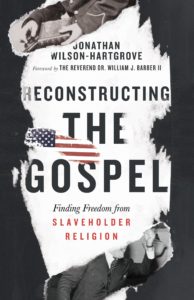 Reconstructing the Gospel: Finding Freedom from Slaveholder Religion Jonathan Wilson-Hartgrove (IVP) $20.00 This good book which released just a year ago, in March of 2018, was one of the volumes that captured many reviewers and had quite a buzz for a bit last Spring. It did want other books this year have done — named the legacy of “American’s Original Sin” and how “slaveholder religion” has not been adequately excised and exorcized from our faith communities. This is a mighty book, important and chilling and powerful. Jonathan, you may recall, came out of Eastern University where he shared a journey somewhat similar to his pal Shane Claiborne. Exposure to healthy evangelical piety and prophetic social critique and a wholistic vision of the Kingdom of God shook his world as he had to re-think his Southern fundamentalist assumptions about church, state, poverty, war, community, mission — and race. Drawn to the ‘new monasticism” he took vows to serve the poor and live simply among those on the margins of the Empire (as they put in their early years.) After years of praying and living and serving among mostly poorer small town folks in the South he has written what may be his most enduring book, inviting us all to find freedom from toxic faith based on white supremacy. It is a remarkable read.
Reconstructing the Gospel: Finding Freedom from Slaveholder Religion Jonathan Wilson-Hartgrove (IVP) $20.00 This good book which released just a year ago, in March of 2018, was one of the volumes that captured many reviewers and had quite a buzz for a bit last Spring. It did want other books this year have done — named the legacy of “American’s Original Sin” and how “slaveholder religion” has not been adequately excised and exorcized from our faith communities. This is a mighty book, important and chilling and powerful. Jonathan, you may recall, came out of Eastern University where he shared a journey somewhat similar to his pal Shane Claiborne. Exposure to healthy evangelical piety and prophetic social critique and a wholistic vision of the Kingdom of God shook his world as he had to re-think his Southern fundamentalist assumptions about church, state, poverty, war, community, mission — and race. Drawn to the ‘new monasticism” he took vows to serve the poor and live simply among those on the margins of the Empire (as they put in their early years.) After years of praying and living and serving among mostly poorer small town folks in the South he has written what may be his most enduring book, inviting us all to find freedom from toxic faith based on white supremacy. It is a remarkable read.
William J. Barber wrote a passionate, moving foreword to Reconstructing the Gospel which hints at just how important this is and how widely respected Jonathan is. We have been grateful to get to sell this vital, feisty book and invite you to read it, and others like it. Let’s make sure that the books published in 2018 aren’t mere fads, and are taken seriously, prayerfully considered, and fuel for our own efforts to “reconstruct the gospel.”
After a strong critique of “slaveholder religion” the second have offers visions and practices to help heal the land by starting with congregational renewal. It rejects (as a chapter in the first half puts it) “the gilded cross in the public square” and invites us to a “Christ-like” posture. This includes moral revival, having church, and “healing the heart.” (He’s been reading Benedict, too, by the way, so themes of staying put and being in community and practicing the presence of God are present as keys to a spirituality that can sustain us in the struggle.
You’ve got to read the Epilogue, a “Letter to my Grandfather and my Son.” Oh my, yes.
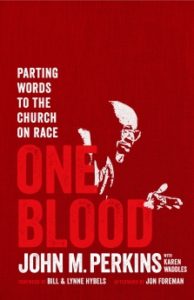 One Blood: Parting Words to the Church on Race and Love John M. Perkins (Moody Press) $15.99 Doubtlessly there are few people who have so influenced American evangelicalism as much as John Perkins. From his 1970s book about being tortured by white cops in Mississippi and his subsequent conversion to Christ (Let Justice Roll Down) to his founding of the Voice of Calvary community and the influential Christian Community Development Association, from his tireless touring and speaking and publishing, Perkins (with a third grade education and several honorary doctorates) has left his mark for the better. To the extent that many evangelicals (despite what the media says) cares about racial justice, poverty, even the redistribution of wealth (one of Perkin’s famous 3 Rs), we have this old saint to thank.
One Blood: Parting Words to the Church on Race and Love John M. Perkins (Moody Press) $15.99 Doubtlessly there are few people who have so influenced American evangelicalism as much as John Perkins. From his 1970s book about being tortured by white cops in Mississippi and his subsequent conversion to Christ (Let Justice Roll Down) to his founding of the Voice of Calvary community and the influential Christian Community Development Association, from his tireless touring and speaking and publishing, Perkins (with a third grade education and several honorary doctorates) has left his mark for the better. To the extent that many evangelicals (despite what the media says) cares about racial justice, poverty, even the redistribution of wealth (one of Perkin’s famous 3 Rs), we have this old saint to thank.
One Blood, he says, is his final book. It deserves reading and reading twice. It deserves awards and applause. With the foreword by Rick Warren and the afterword by his young white rock star friend, Jon Foreman of Switchfoot, One Blood invites us to keep up the good fight, in the name of God, in the power of love. He highlights a few multi-ethnic churches that are doing this kind of work, so there are a few other contributors. Karen Waddles helped with the book and there is a nice study guide, making it ideal for book clubs and small groups. One Blood is really fine, from a hero and wise elder. Don’t miss it.
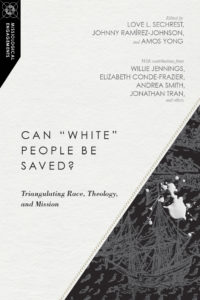 Can “White” People Be Saved? Triangulating Race, Theology, and Mission edited by Love L. Secrest, Johnny Ramirez-Johnson, and Amos Yong with contributions by Willie Jennings, Elizabeth-Conde-Frazer, Andrea Smith, Jonathan Tran, and others (IVP Academic) $30.00 Wow, just the title alone is pretty intense, eh? Of course, there are layers of meaning to the question (not to mention those quotation marks) and even though it is a solidly evangelical publishing house that published this collection of academic pieces, it is serious, prophetic, hard-hitting, and admittedly provocative. For anyone who is keeping current on the more academic studies of faith and race theory and missional justice work, this simple is essential. Let me say that again: essential.
Can “White” People Be Saved? Triangulating Race, Theology, and Mission edited by Love L. Secrest, Johnny Ramirez-Johnson, and Amos Yong with contributions by Willie Jennings, Elizabeth-Conde-Frazer, Andrea Smith, Jonathan Tran, and others (IVP Academic) $30.00 Wow, just the title alone is pretty intense, eh? Of course, there are layers of meaning to the question (not to mention those quotation marks) and even though it is a solidly evangelical publishing house that published this collection of academic pieces, it is serious, prophetic, hard-hitting, and admittedly provocative. For anyone who is keeping current on the more academic studies of faith and race theory and missional justice work, this simple is essential. Let me say that again: essential.
The question of how to “de-colonize” missions should be obviously crucial; what it means to “decenter” whiteness in our study of missions (and even how we should more deeply understand Dr. King’s “beloved community”) is burning. This big book has admittedly many authors from various perspectives but it hangs together as a momentous manifesto.
This book is nicely dedicated to a handful of scholars who founded the multilingual and multicultural programs at Fuller Theological Seminary, the most diverse seminary in the world, I believe. One of those is Bill Pannell, an early influence on us, a black, evangelical gentlemen I met in my college years through the CCO and who sometimes would call us in our early days at the shop to encourage us to keep on keeping on. To see his name on the inside touched my heart. C is a serious and extraordinary book of interest to anyone serious about global missions, evangelistic theory, race studies and cross-cultural theology.
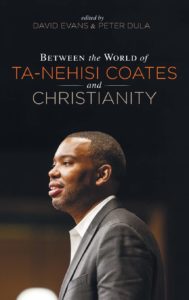 Between the World of Ta-Nehisi Coates and Christianity edited by David Evans & Peter Dula (Cascade Books) $17.00 As many readers of BookNotes know, Coates has been perhaps the most important public intellectual writing profoundly about racism in our culture in many years. We’ve long carried his moving memoir about growing up in Baltimore, The Beautiful Struggle. He became famous as a journalist (and many of his previously published pieces from places such as The Atlantic were published in the must-have collection from 2017 We Were Eight Years in Power: An American Tragedy; it is now in paperback, by the way.) HIs most famous and beloved and controversial work, though, is Between the World and Me which is memoir and essay and polemic and story and prophecy. Appreciate his deep, deep Afro-center anger and righteous call for change or not, he is a scholar and artist and pundit to be reckoned with.
Between the World of Ta-Nehisi Coates and Christianity edited by David Evans & Peter Dula (Cascade Books) $17.00 As many readers of BookNotes know, Coates has been perhaps the most important public intellectual writing profoundly about racism in our culture in many years. We’ve long carried his moving memoir about growing up in Baltimore, The Beautiful Struggle. He became famous as a journalist (and many of his previously published pieces from places such as The Atlantic were published in the must-have collection from 2017 We Were Eight Years in Power: An American Tragedy; it is now in paperback, by the way.) HIs most famous and beloved and controversial work, though, is Between the World and Me which is memoir and essay and polemic and story and prophecy. Appreciate his deep, deep Afro-center anger and righteous call for change or not, he is a scholar and artist and pundit to be reckoned with.
Evans and Dula are thoughtful Christian scholars at a Mennonite institution of higher education, and they have taught this atheists work in the classroom. Out of this engagement with Between the World and Me and other of Ta-Nehisi Coates’s polemics comes this slim volume where they invited other Christian academics to offer chapters thinking about Coates’s views. This is a beautiful example of the integration of faith and scholarship, of academia and the real world, of Christian higher ed engaging the issues of the day by listening to and entering into respectful dialogue with one of the culture’s major voices. Kudos to Evans and Dula and to Eastern Mennonite where they teach.
Here is the Table of Contents and the contributing authors:
- Echoes from the Mecca and the Capstone: Christianity and Social Justice at Howard University – Cheryl J. Sanders
- Black Futures and Black Fathers – Vincent Lloyd
- Shall We Awake? – Jennifer Harvey
- The American Nightmare and the Gospel of Plunder – David Evans
- What Does He Mean by, “They Believe They Are White”? – Reggie Williams
- Hope’s Vagaries: How Ta-Nehisi Coates and Vincent Harding Convinced Me That Hope Is Not the Only Option – Tobin Miller Shearer
- Between the Tragic and the Unhopeless: Coates, Anti-blackness, and the Tireless Work of Negativity – Joseph Winters
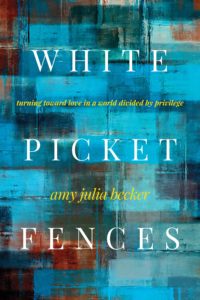 White Picket Fences: Turning Toward Love in a World Divided by Privilege Amy Julia Becker (NavPress) $15.99 I hope you recall that we celebrated this a time or two previously at BookNotes. We so respect Becker as a writer and thinker; her previous books have been about her journey of being a mother of a child with intellectual disabilities. (You really should read A Good and Perfect Gift: Faith, Expectations, and a Little Girl Named Penny or her delightful, but smart, Small Talk: Learning from My Children about What Matters Most.) This recent one, certainly a notable, best Book of 2018, reflects on privilege in a way that is thoughtful and wise and balanced and assessable. There is plenty of fire in Ms. Becker, but she has a different style and vision than, say, Ta-Nehisi Coates. This is a thoughtful, classy, brave book, very nicely done.
White Picket Fences: Turning Toward Love in a World Divided by Privilege Amy Julia Becker (NavPress) $15.99 I hope you recall that we celebrated this a time or two previously at BookNotes. We so respect Becker as a writer and thinker; her previous books have been about her journey of being a mother of a child with intellectual disabilities. (You really should read A Good and Perfect Gift: Faith, Expectations, and a Little Girl Named Penny or her delightful, but smart, Small Talk: Learning from My Children about What Matters Most.) This recent one, certainly a notable, best Book of 2018, reflects on privilege in a way that is thoughtful and wise and balanced and assessable. There is plenty of fire in Ms. Becker, but she has a different style and vision than, say, Ta-Nehisi Coates. This is a thoughtful, classy, brave book, very nicely done.
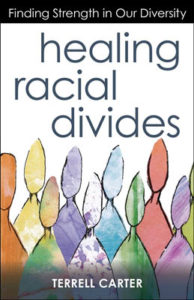 Healing Racial Divides: Finding Strength in our Diversity Terrell Carter (Chalice Press) $19.99 This thin book is concise and potent and very useful. In a no-nonsense style, Rev. Dr. Carter — a St. Louis pastor, seminary professor, former police officer, and now Director of Contextualized Learning at Central Baptist Seminary in Shawnee, Kansas — shows us how to bring awareness and strategies for helping congregations discern what they can do. There’s some personal narrative, some global thinking, some Bible teaching and a whole lot of good sense, learned the hard way. Carter draws on legendary, important black thinkers such as James Cone and Gayraud Wilmore and respected contemporary practitioners like Jospeh Brandt and Kristen Du Mez and Michael Emerson. Perfect for those who want to hear a somewhat progressive voice of a historic black Baptist. There is a free study guide available for download at the publishers’s website.
Healing Racial Divides: Finding Strength in our Diversity Terrell Carter (Chalice Press) $19.99 This thin book is concise and potent and very useful. In a no-nonsense style, Rev. Dr. Carter — a St. Louis pastor, seminary professor, former police officer, and now Director of Contextualized Learning at Central Baptist Seminary in Shawnee, Kansas — shows us how to bring awareness and strategies for helping congregations discern what they can do. There’s some personal narrative, some global thinking, some Bible teaching and a whole lot of good sense, learned the hard way. Carter draws on legendary, important black thinkers such as James Cone and Gayraud Wilmore and respected contemporary practitioners like Jospeh Brandt and Kristen Du Mez and Michael Emerson. Perfect for those who want to hear a somewhat progressive voice of a historic black Baptist. There is a free study guide available for download at the publishers’s website.
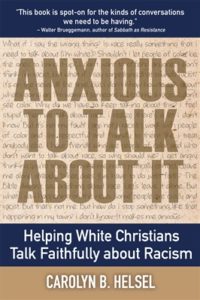 Anxious To Talk About It: Helping White Christians Talk Faithfully about Racism Carolyn Helsel (Chalice Press) $19.99 We are glad for this Presbyterian seminary prof and race training facilitator who has written a very useful tool — award winning, actually. (It was named as a 2018 Book of the Year from the Academy of Parish Clergy, a very prominent award.) Anxious to Talk About It (what a great title!) is a book has been used by mainline denominational groups I know and they have found it very useful, open and fair and inviting. Let’s face it — many white people are overwhelmed when this topic comes up, anxious, indeed. Helsel offers tools to engage racial justice concerns with less fear, more compassion, and more knowledge. We’re impressed and anxious — as in
Anxious To Talk About It: Helping White Christians Talk Faithfully about Racism Carolyn Helsel (Chalice Press) $19.99 We are glad for this Presbyterian seminary prof and race training facilitator who has written a very useful tool — award winning, actually. (It was named as a 2018 Book of the Year from the Academy of Parish Clergy, a very prominent award.) Anxious to Talk About It (what a great title!) is a book has been used by mainline denominational groups I know and they have found it very useful, open and fair and inviting. Let’s face it — many white people are overwhelmed when this topic comes up, anxious, indeed. Helsel offers tools to engage racial justice concerns with less fear, more compassion, and more knowledge. We’re impressed and anxious — as in 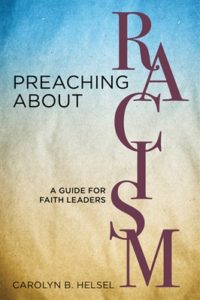 eager — to celebrate it here and invite you to use it. It’s got a lot of really great ideas and guidance for leading discussion groups and workshops and such. (Chalice Press offers a free group leader’s guide, too, at their website.)
eager — to celebrate it here and invite you to use it. It’s got a lot of really great ideas and guidance for leading discussion groups and workshops and such. (Chalice Press offers a free group leader’s guide, too, at their website.)
By the way, don’t miss Preaching about Racism: A Guide for Faith Leaders also by Rev. Carolyn Helsel (Chalice Press; $26.99.) This is a homiletics book that Dr, Helsel published later in the year, after her important Anxious to Talk About It. It’s a useful guide for all sorts of preachers. What a good year 2018 has been with these great resources and tools. Kudos to Chalice for caring about raising these questions in our mainline churches.
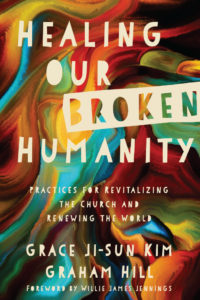 Healing our Broken Humanity: Practices for Revitalizing The Church and Renewing the World Grace Ji-Sun Kim & Graham Hill (IVP) $17.00 Ms Kim is an important scholar and activist and has written other good work but here she shines as she offers an extraordinary, broad and visionary picture of how a renewed (reconciled) church can help bring about restoration and justice for the common good. As we noted when we first announced this in the summer of 2018, this is surely one of the most important books of its kind this year, inviting us to all kinds of fresh ideas and new practices and faithful experiments with how to be peacemaking people, renewed and renewing, for the sake of the world.
Healing our Broken Humanity: Practices for Revitalizing The Church and Renewing the World Grace Ji-Sun Kim & Graham Hill (IVP) $17.00 Ms Kim is an important scholar and activist and has written other good work but here she shines as she offers an extraordinary, broad and visionary picture of how a renewed (reconciled) church can help bring about restoration and justice for the common good. As we noted when we first announced this in the summer of 2018, this is surely one of the most important books of its kind this year, inviting us to all kinds of fresh ideas and new practices and faithful experiments with how to be peacemaking people, renewed and renewing, for the sake of the world.
There are actually nine transforming practices described here, and then there are meaty appendices, discussion questions, forms for use in conversation, even accountability stuff to use in the local setting. This is really useful for those who are serious. It can be used by all kinds of congregations, by the way, but Dr. Grace Ji-Sun Kim is ordained in the PC(USA.)
The number of impressive scholars and pastors and activists who have endorsed this notable itself — from Soong-Chan Rah and Randy Woodley to missional Aussie Michael Frost to the vibrant black preacher Jacqui Lewis. There is a very important foreword by Willie James Jennings.
This book is simply incredible…it is robust in theology, rich in ecclesiology, and practical in application. Tara Beth Leach (pastor of First Church of the Nazarene of Pasadena.)
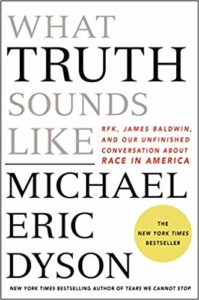 What Truth Sounds Like: RFK, James Baldwin, and our Unfinished Conversation About Race in America Michael Eric Dyson (St. Martin’s Press) $24.99 This compact, chunky-sized, hardback looks and feels like a companion volume to Dyson’s 2017, powerful Tears We Cannot Stop and may be even more important as that one. Of course, we carry almost anything this Philly-based, nationally-revered sociologist and black pastor writes, but What Truth Sounds Like was particularly interesting to me. It ruminates on the “epochal” meeting in the spring of 1963 between Robert Kennedy and James Baldwin. You may have heard of that famous gathering held in Bobby Kennedy’s New York penthouse. Other guests for the conversation included beloved entertainers (and serious civil rights leaders) Harry Belafonte and Lena Horne, playwright Lorraine Hansberry, and a young social activist named Jerome Smith.
What Truth Sounds Like: RFK, James Baldwin, and our Unfinished Conversation About Race in America Michael Eric Dyson (St. Martin’s Press) $24.99 This compact, chunky-sized, hardback looks and feels like a companion volume to Dyson’s 2017, powerful Tears We Cannot Stop and may be even more important as that one. Of course, we carry almost anything this Philly-based, nationally-revered sociologist and black pastor writes, but What Truth Sounds Like was particularly interesting to me. It ruminates on the “epochal” meeting in the spring of 1963 between Robert Kennedy and James Baldwin. You may have heard of that famous gathering held in Bobby Kennedy’s New York penthouse. Other guests for the conversation included beloved entertainers (and serious civil rights leaders) Harry Belafonte and Lena Horne, playwright Lorraine Hansberry, and a young social activist named Jerome Smith.
Here’s the gist of that argument, as the publisher describes it on the flap of the book cover:
Baldwin and friends charged RFK with being ignorant of black life and struggle, and Kennedy countered that the black elite emphasized witness — attesting to suffering — over policy.
Of course, in different ways, that debate continues today. (Or it will, for those who read this astute little book.) The cover copy continues:
Every group represented by the people in that room — politicians, artists, intellectuals, activists — has the power to fix what still ails us. Examining the role of everyone from Jay-Z to Kamala Harris and everything from Black Lives Matters to Black Panther, Dr. Dyson asks us all to seize Baldwin’s challenge.
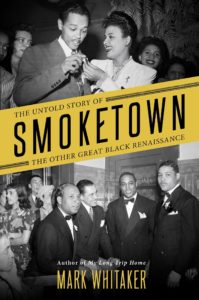 Smoketown: The Other Great Black Renaissance Mark Whitaker (Simon & Schuster) $17.00 This book came out a year ago, but we celebrate it now, here, since the paperback edition came out late in 2018. What a fine, fine work of history — a page-turner, actually — and an extraordinary account of the black culture of mid-20th century Pittsburgh. Here’s the thing: they aren’t kidding when they talk about the Pittsburgh Renaissance in the revered phrase similar to the Harlem Renaissance. I used to live in Pittsburgh — and read the historic black paper, the Pittsburgh Courier sometimes, and had friends deeply involved in life in the famed The Hill district and such, but I had no idea of the stunning breadth of this beautiful, consequential era. From the 1920s to the 1950s so much was happening in the black community in Pittsburgh. Besides the nationally-known aforementioned paper, there were playwrights like August Wilson, two Negro Leagues ball teams, jazz giants, artists, intellectuals, entrepreneurs, a “citadel of black aspiration in music, sports, business, and culture.” What an enticing and wonderfully-written bit of American history this is.
Smoketown: The Other Great Black Renaissance Mark Whitaker (Simon & Schuster) $17.00 This book came out a year ago, but we celebrate it now, here, since the paperback edition came out late in 2018. What a fine, fine work of history — a page-turner, actually — and an extraordinary account of the black culture of mid-20th century Pittsburgh. Here’s the thing: they aren’t kidding when they talk about the Pittsburgh Renaissance in the revered phrase similar to the Harlem Renaissance. I used to live in Pittsburgh — and read the historic black paper, the Pittsburgh Courier sometimes, and had friends deeply involved in life in the famed The Hill district and such, but I had no idea of the stunning breadth of this beautiful, consequential era. From the 1920s to the 1950s so much was happening in the black community in Pittsburgh. Besides the nationally-known aforementioned paper, there were playwrights like August Wilson, two Negro Leagues ball teams, jazz giants, artists, intellectuals, entrepreneurs, a “citadel of black aspiration in music, sports, business, and culture.” What an enticing and wonderfully-written bit of American history this is.
Whitaker, by the way, has a memoir called My Long Trip Home and is a renowned journalist having worked at the top of CNN and NBC News and was the senior editor of Newsweek. He knows his stuff. I think nearly anyone who likes history or wants to understand black culture would enjoy the untold story of Smoketown — “the other great black renaissance.” And if you are from Pittsburgh — what are you waiting for?
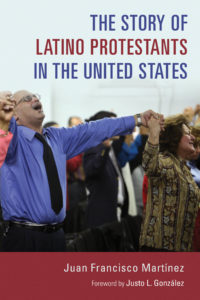 The Story of Latino Protestants in the United States Juan Francisco Martinez (Eerdmans) $28.00 Kudos to Eerdmans for seeing the need for a book like this and to Dr. Martinez, a professor of Hispanic studies and pastoral leadership at Fuller Theological Seminary. He is a fifth-generation American Latino Protestant himself, we learn, and is considered one of the leading experts on the movement and its colorful history.
The Story of Latino Protestants in the United States Juan Francisco Martinez (Eerdmans) $28.00 Kudos to Eerdmans for seeing the need for a book like this and to Dr. Martinez, a professor of Hispanic studies and pastoral leadership at Fuller Theological Seminary. He is a fifth-generation American Latino Protestant himself, we learn, and is considered one of the leading experts on the movement and its colorful history.
When we said 2018 was a banner year for studies of race and cultural diversity, we weren’t kidding. This is a groundbreaking book, the only serious resource of its kind. It provides the first major historical overview of Latino Protestantism in the United States. It starts in the early nineteenth century and explores the movement up until the present time. Rave reviews grace the back from the likes of Gabriel Salguero.
United Methodist scholar and esteemed church historian Justo Gonzalez nicely offers a very good foreword. This is a major contribution.
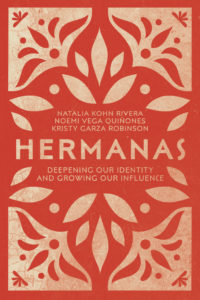 Hermanas: Deepening Our Identity and Growing Our Influence Natalie Kohn, Noemi Vega Quinones & Kristy Harza Robinson (IVP) $16.00 Okay, this is another I am going to stretch the rules just a bit in order to list this here. We received this right at the very end of 2018 — like maybe the second to last day of the year and while it has a formal 2019 copyright, it might have been the last new book we put out in 2018. And so, we’ll formally award it, I’m sure, as one of the Best Books fo 2019, but we’re jumping in early and celebrating it now, too. As we explained early on, this is a book of Biblical study, exploring woman of the Bible through the lenses of thoughtful Latina women today.
Hermanas: Deepening Our Identity and Growing Our Influence Natalie Kohn, Noemi Vega Quinones & Kristy Harza Robinson (IVP) $16.00 Okay, this is another I am going to stretch the rules just a bit in order to list this here. We received this right at the very end of 2018 — like maybe the second to last day of the year and while it has a formal 2019 copyright, it might have been the last new book we put out in 2018. And so, we’ll formally award it, I’m sure, as one of the Best Books fo 2019, but we’re jumping in early and celebrating it now, too. As we explained early on, this is a book of Biblical study, exploring woman of the Bible through the lenses of thoughtful Latina women today.
As Sandra Maria Van Opstal (author of the great book on multi-ethnic worship, The Next Worship) puts it, Hermanas is “a gift to anyone teaching and preaching from the Scriptures to have this in their theological library.”
Agreed. But, I’d say, not just those teaching and preaching, but anybody who cares about faith formation, the Bible, Christian discipleship, mentorship, leadership, public witness, or making a faithful difference — these Biblical stories of twelve often disenfranchised but clever women come alive in the hands of these Latinas.
This is a very special book written by three mujeres poderosas and I hardly know anything else like it. Felicidades!
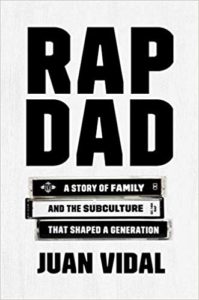 Rap Dad: A Story of Family and the Subculture That Shaped a Generation Jaun Videl (Atria Books) $26.00 Videl is a respected commentator and essayist whose work is appearing all over, from NPR to Esquire and Rolling Stone. He is a thoughtful pundit on issues of race, urban culture, hip-hop and pop music and, yes, now, fatherhood. The book starts in vivid writing, with pages that seem to shift from exceptionally creative writing, pushing the limits normal speech with high-octane prose laden with street slang, Latino culture, and old-school rap references to fairly straightforward explanation of his youth, raised my a caring mom and violent dad who left early on deepening his life of drug dealing and jail. It’s no wonder the kid took to petty crime and hard skateboarding and is moving to hear how he found solace in 80s and 90s rap.
Rap Dad: A Story of Family and the Subculture That Shaped a Generation Jaun Videl (Atria Books) $26.00 Videl is a respected commentator and essayist whose work is appearing all over, from NPR to Esquire and Rolling Stone. He is a thoughtful pundit on issues of race, urban culture, hip-hop and pop music and, yes, now, fatherhood. The book starts in vivid writing, with pages that seem to shift from exceptionally creative writing, pushing the limits normal speech with high-octane prose laden with street slang, Latino culture, and old-school rap references to fairly straightforward explanation of his youth, raised my a caring mom and violent dad who left early on deepening his life of drug dealing and jail. It’s no wonder the kid took to petty crime and hard skateboarding and is moving to hear how he found solace in 80s and 90s rap.
It is harrowing and an immersion into street life and hard hip hop and Latinex culture, but one realizes from back cover raves that Videl settles down and learns to become not only a respected pop music critic but a (postmodern) sort of good family man. He wants to be a good dad. Rap Dad is the telling of this story — a triumphant tale of moral improvement and learning the art of caring fatherhood as well as the exploration of the influential role (for better and for worse) of the rap subculture. There’s serious discussion of tracks and rhymes and beats and superstars, especially the stuff he grew up on in end of the 20th century Miami.
(Although — he’s still at it; the playlist offered at the end is pretty up to date — proper.)
It’s not every book that narrates an episode at which I was an observer and even though it was merely in passing, I couldn’t believe my eyes! What fun — in passing he mentions hearing hip hop artist Lupe Fiasco being interviewed by black preacher/philosopher Cornel West at Calvin College’s Festival of Faith & Music. Later (in an unexpected turn in this book on a general market/secular publisher) he takes an interest in church, talks about God and faith, and listens to some thoughtful, Christian rap and hi-hop. (Indeed, he name checks faith leaders like Alex Medina and Sho Baraka and Lecrae in his acknowledgments.) Man, I didn’t see that coming.
Rap Dad is a very fine, very creative and pretty edgy bit of writing exploring the interface of race, rap, and family. It’s not for everyone, although many of us need to be reminded of the heartbreak of troubled kids without fathers. Much of this is straight, Latino memoir. It is not only about race and urban injustice, but it’s a very appropriate read for this list and will be an enjoyable one for those paying attention to pop culture. It was unlike any other book I read from last year and important to be listed as one of the notable books of 2018.
Check out these endorsements:
In Rap Dad, Juan Vidal captures all of the angles of being a rap fan who falls in love with the genre and then fights to stay in love with it at all costs, despite life’s many twists. In reading this book, I learned a greater love for what I already love, I learned that there is a future in which that love can remain abundant, limitless, and endlessly fulfilling. I am thankful for this personal, funny, insightful ride.”— Hanif Abdurraqib, author of They Can’t Kill Us Until They Kill Us
“Rap Dad is a page-turner. It’s drenched in history and encompasses the energy, fire, and passion that is hip-hop. Vidal is a brilliant storyteller with a knack for prose. This book is a reminder of why I can’t live without writing.”— D. Watkins, New York Times bestselling author of The Beast Side and The Cook Up
“Rap Dad is a tender, occasionally heartbreaking, and exceedingly honest look at what it means to be a modern father in America (and, really, what it’s meant to be a father in America in decades past). Vidal writes with all the grace and insight you’d want from someone untangling such intricate, intimate subject matter.”—Shea Serrano, New York Times bestselling author of The Rap Yearbook and Basketball And Other Things
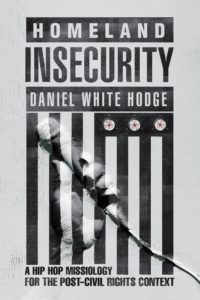 Homeland Insecurity: A Hip-Hop Missiology for the Post-Civil Rights Context Daniel White Hodge (IVP Academic) $27.00 I’ve read a few of doc Hodge’s good books — check out his 2010 very good The Soul of Hip Hop: Rims, Timbs and a Cultural Theology. (He also did another scholarly work in 2018 called Hip Hop’s Hostile Gospel: A Post-Soul Theological Exploration published last Spring by Haymarket Books ($28.99) that has gotten critical acclaim.) But this one should be considered a vital work for 2018 and needs to be on our list of Best Books of the Year. I wrote a bit about it last summer at BookNotes, saying, Homeland Insecurity is a profound and heady study of how we can develop a missiology (that is, a philosophy of contextualized mission) in our post-soul music, post-civil rights political era. This is important, serious, and highly recommended although it is, necessarily, looking at some hard stuff with course language.
Homeland Insecurity: A Hip-Hop Missiology for the Post-Civil Rights Context Daniel White Hodge (IVP Academic) $27.00 I’ve read a few of doc Hodge’s good books — check out his 2010 very good The Soul of Hip Hop: Rims, Timbs and a Cultural Theology. (He also did another scholarly work in 2018 called Hip Hop’s Hostile Gospel: A Post-Soul Theological Exploration published last Spring by Haymarket Books ($28.99) that has gotten critical acclaim.) But this one should be considered a vital work for 2018 and needs to be on our list of Best Books of the Year. I wrote a bit about it last summer at BookNotes, saying, Homeland Insecurity is a profound and heady study of how we can develop a missiology (that is, a philosophy of contextualized mission) in our post-soul music, post-civil rights political era. This is important, serious, and highly recommended although it is, necessarily, looking at some hard stuff with course language.
Hodge is dead serious and brings the zeal and directness of hip hop and rap to the question of missiology, asking how passion for justice and authentic incarnation will be enhanced and given credibility if it takes serious the message from the streets. Can hip hop provide methodology, insight, an approach for missional living? Right on.
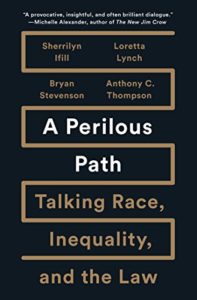 A Perilous Truth: Thinking About Race, Inequality, and the Law (The New Press) $14.99 I am sure almost anyone who reads BookNotes knows how we value the remarkable work of legal aid work of literal life-saver Bryan Stevenson, one of the great legal activists and social reformers of our generation. His Just Mercy (and the 2018 release of a version adapted for youth called Just Mercy: A True Story of the Fight for Justice ) is one of our all time favorite books. Well, did you know that 2018 also saw a small hardback narrating a conversation with Bryan and three other very important figures in the modern civil rights movement? A Perilous Truth explores the legal aspects of racial injustices and is a must-read for anyone interested in social injustice and certainly for anyone in law, whether an attorney, judge, or law student. We comment this book to you as it allows you to listen in on a stimulating and provocative conversation.
A Perilous Truth: Thinking About Race, Inequality, and the Law (The New Press) $14.99 I am sure almost anyone who reads BookNotes knows how we value the remarkable work of legal aid work of literal life-saver Bryan Stevenson, one of the great legal activists and social reformers of our generation. His Just Mercy (and the 2018 release of a version adapted for youth called Just Mercy: A True Story of the Fight for Justice ) is one of our all time favorite books. Well, did you know that 2018 also saw a small hardback narrating a conversation with Bryan and three other very important figures in the modern civil rights movement? A Perilous Truth explores the legal aspects of racial injustices and is a must-read for anyone interested in social injustice and certainly for anyone in law, whether an attorney, judge, or law student. We comment this book to you as it allows you to listen in on a stimulating and provocative conversation.
Again, you should know our Christian acquaintance Bryan Stevenson, a graduate of Eastern University and Harvard Law School. The other authors are Sherrilyn Ifill (the sister of the late Public Broadcasting journalist Gwen Ifill, who grew up in Steelton, PA) who now is president of the NAACP Legal Defense & Educational Fund; Loretta Lynch who was the eighty-third attorney general of the US, and Anthony Thompson, a professor of clinical law and the faculty director fo the Center on Race, Inequality, and the Law at New York University School of Law. Together they offer a “blisteringly candid discussion of the American dilemma in the Age of Trump.” It is, according to the Kirkus Review, “A wake-up call for the American Dream.”
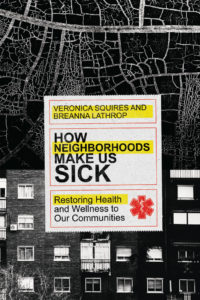 How Neighborhoods Make Us Sick: Restoring Health and Wellness to Our Communities Veronica Squires & Breanna Lathrop (IVP) $17.00 Of course toxic buildings and environmental dangers are not exclusively the plight of those living in parts of cities populated by people of color, but there is a thing called environmental racism, and it is undeniable that those in poorer neighborhoods often people of color, are plagued with bad water and industrial pollution and lead paint and asbestos and the like in levels much worse than wealthier and mostly whiter parts of town. Further, as Squires and Lathrop bravely discuss, even the psychological conditions of living with racial trauma has significant documented health repercussions. (I’m writing this just days after a police officer in Pittsburgh was exonerated for shooting a boy in the back as he was running away; a good friend of mine, a black pastor in ‘the burgh, wrote that he hardly feels safe in his own town.) These troubles — physical, sociological, psychological — impact the health of those living in disadvantaged neighborhoods.
How Neighborhoods Make Us Sick: Restoring Health and Wellness to Our Communities Veronica Squires & Breanna Lathrop (IVP) $17.00 Of course toxic buildings and environmental dangers are not exclusively the plight of those living in parts of cities populated by people of color, but there is a thing called environmental racism, and it is undeniable that those in poorer neighborhoods often people of color, are plagued with bad water and industrial pollution and lead paint and asbestos and the like in levels much worse than wealthier and mostly whiter parts of town. Further, as Squires and Lathrop bravely discuss, even the psychological conditions of living with racial trauma has significant documented health repercussions. (I’m writing this just days after a police officer in Pittsburgh was exonerated for shooting a boy in the back as he was running away; a good friend of mine, a black pastor in ‘the burgh, wrote that he hardly feels safe in his own town.) These troubles — physical, sociological, psychological — impact the health of those living in disadvantaged neighborhoods.
We have long wished for a readable, affordable book about public health from a Christian perspective. And, we have long wished for a book about the poverty experienced by the urban underclass which includes more about substandard housing and the health problems associated with leaky pipes which cause mildew, sewage problems, asbestos, and the like.
How Neighborhoods Make Us Sick is a godsend and we congratulate IVP for being the first publisher to make this contribution to our understanding of how sin and dysfunction has badly effected our built environment and how social injustice literally has public health implications.
The book is well designed, handsome, interesting, well informed, passionate without being polemical, and a generous look at the stark realities of public health in old and often poor and often urban settings.
Kudos and many thanks to these authors. Here are their bios for those who might want to know solid credentials and be pleased to learn of their deep experience:
Veronica Squires is chief administrative officer for Good Samaritan Health Center in Atlanta. She previously served as director of corporate development for Boys and Girls Clubs of Metro Atlanta and as the Georgia director of ministry partnerships for InterVarsity Christian Fellowship. She is a certified CCDA practitioner and serves on the advisory board for the Georgia Charitable Care Network.
Breanna Lathrop is chief operating officer and a family nurse practitioner for Good Samaritan Health Center. She earned her Doctor of Nursing Practice from Georgia Southern University and a Master’s of Public Health and a Master’s in Nursing from Emory University. She is passionate about eliminating health disparities through improving health care access and health outcomes among vulnerable populations, and has previously published on the social determinants of health.
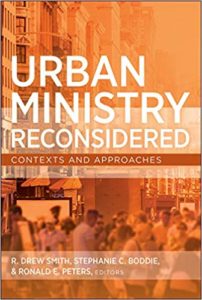 Urban Ministry Reconsidered: Contexts and Approaches (Westminster/John Knox) $40.00 I simply don’t have time and space to do a major review of this and do it justice as it is extraordinary and covers so much ground. Here is what I wrote before at BookNotes when it first came out: Let me just note that if you know anybody who is seriously studying this topic, this is a major anthology, edited by leaders of the Metro-Urban Institute at the Pittsburgh Theological Seminary. These folks have decades of scholarship and practice as theologians and activists. There are chapters on poverty, housing, health, racism, missional church stuff, global insights, and lots more. It is fairly diverse theologically, mostly progressive in terms of social agenda, and pretty scholarly. It advances a number of fresh insights, offers current research and we have a few trusted friends (such as Lisa Slayton & Herb Kolbe of the Pittsburgh Leadership Foundation) who have chapters in it. There is nothing on the topic with so wide a scope on the market — again, further proof that 2018 has been an important year with publishers doing commendable work.
Urban Ministry Reconsidered: Contexts and Approaches (Westminster/John Knox) $40.00 I simply don’t have time and space to do a major review of this and do it justice as it is extraordinary and covers so much ground. Here is what I wrote before at BookNotes when it first came out: Let me just note that if you know anybody who is seriously studying this topic, this is a major anthology, edited by leaders of the Metro-Urban Institute at the Pittsburgh Theological Seminary. These folks have decades of scholarship and practice as theologians and activists. There are chapters on poverty, housing, health, racism, missional church stuff, global insights, and lots more. It is fairly diverse theologically, mostly progressive in terms of social agenda, and pretty scholarly. It advances a number of fresh insights, offers current research and we have a few trusted friends (such as Lisa Slayton & Herb Kolbe of the Pittsburgh Leadership Foundation) who have chapters in it. There is nothing on the topic with so wide a scope on the market — again, further proof that 2018 has been an important year with publishers doing commendable work.
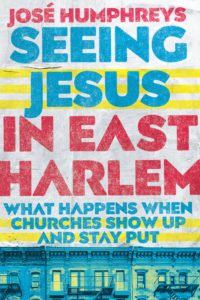 Seeing Jesus in East Harlem: What Happens When Churches Show Up and Stay Put Jose Humphreys (IVP) $16.00 I wrote about this earlier, too, and want to honor it again as a vital and important work from 2018. Here is some of what I said in one of my BookNotes announcements:
Seeing Jesus in East Harlem: What Happens When Churches Show Up and Stay Put Jose Humphreys (IVP) $16.00 I wrote about this earlier, too, and want to honor it again as a vital and important work from 2018. Here is some of what I said in one of my BookNotes announcements:
This great book is part of the Praxis imprint and, with the colorful cover, is immediately attractive. This is very much about a sense of place in the urban context and how our own stories and faith formation are tied to particular places. The author is a Puerto Rica pastor who has planted a multi-ethnic church in East Harlem and this book is ideal for anyone thinking practically about urban ministry.
Humphreys is pastor of Metro Hope Covenant Church and I like that the church is described as being “involved in shalom-making in the city through facilitating conversation contemplation, and action across social, economic, cultural, and theological boundaries.”
Good, good evangelically-minded activist/scholars/pastors endorse this with rave reviews, from Soong-Chan Rah to Paul Sparks (of The New Parish) who says, “Go get this amazing book!”) to Lisa Sharon Harper, who says it is:
A beautiful love letter to the church about how to be church in our browning, decolonizing world…Every pastor’s next must-read.
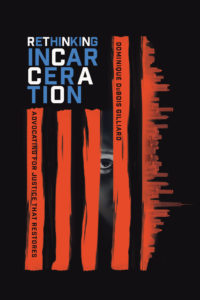 Rethinking Incarceration Advocating for Justice That Restores Dominique Dubois Gilliard (IVP) $18.00 Most aware readers know about what is not called “mass incarceration” and the injustices told in such powerful narratives as Bryan Stevenson’s Just Mercy or The Sun Does Shine: How I Found Freedom on Death Row by Anthony Ray Hinton (surely one of the most moving memoirs and favorite books I read last year.) The classic in this field is The New Jim Crow by Michelle Alexander, that shows in detailed data and much number-crunching, that over and over and over, in state by state by state, people of color arrested for the exact same crime are given much harsher sentences than their white counterparts. This book is so important there have been several books about it and the phrase — the new Jim Crow — is now shorthand for this outrageous and indisputable example of systemic racism.
Rethinking Incarceration Advocating for Justice That Restores Dominique Dubois Gilliard (IVP) $18.00 Most aware readers know about what is not called “mass incarceration” and the injustices told in such powerful narratives as Bryan Stevenson’s Just Mercy or The Sun Does Shine: How I Found Freedom on Death Row by Anthony Ray Hinton (surely one of the most moving memoirs and favorite books I read last year.) The classic in this field is The New Jim Crow by Michelle Alexander, that shows in detailed data and much number-crunching, that over and over and over, in state by state by state, people of color arrested for the exact same crime are given much harsher sentences than their white counterparts. This book is so important there have been several books about it and the phrase — the new Jim Crow — is now shorthand for this outrageous and indisputable example of systemic racism.
Enter Dominique DuBois Gillard, an advocate for reform, for restorative justice, for a distinctively Christian contribution to the debates and street level (and policy level) activism for change. “Mass incarceration has become a lucrative industry, and the criminal justice system is plagued with bias and unjust practices,” the book reminds us on the back cover.
“And the church has unwittingly contributed to the problem.”
Rethinking Incarceration is not the first Christian book to study prisons and prison reform — in stands in a centuries old tradition of faith-based efforts, that itself goes back to the earliest Christians. But it is a major contribution in part because of the astute and vital way it weaves racial analysis into the mix. And it has gotten rave reviews from important reviewers and activists alike.
For instance, Publishers Weekly gave it a prized “starred review” saying is it “an outstanding contribution.” Soong-Chan Rah says it “should be now required reading for any thinking and feeling American Christian who wants to engage the topic of mass incarceration in a meaningful way.”
We all know that the United States has more people locked up in jails, prisons, and detention centers than any other country in the history of the world. We know something is very wrong, and Gilliard’s historical lens is a good place to help. His Biblical work is exciting and generative, and his practical and innovative interventions give us handles on things we can propose, pray for, and actually do. This book deserves to be taken seriously, to be well known, and is surely one of the most significant 2018 books for Christian who care about peace and justice and race and public discipleship. The book has a great cover, too — our compliments to the designer.
Praise the Lord for Dominque DuBois Gilliard who is the director of racial righteousness and reconciliation for the Love Mercy Do Justice initiative of the Evangelical Covenant Church. He is an ordained minister and has served in Oakland, Chicago and Atlanta.
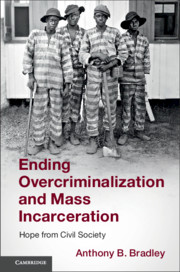 Ending Overcriminalization and Mass Incarceration: Hope from Civil Society Anthony Bradley (Cambridge University Press) $34.99 This is certainly a major scholarly work, released last summer by one of the world’s oldest and most venerable publishing houses, the noble University of Cambridge. Dr. Bradley is a compelling and lively and funny gospel communicator — he speaks at our Jubilee conference from time to time, always to grand applause — and is a mature and careful thinker. He brings the implications of the Lordship of Christ and the Kingdom of God (about which he has published) to many social concerns and issues and has several worthy books offering collections of essays. He has written much about human flourishing, moral formation, and freedom.
Ending Overcriminalization and Mass Incarceration: Hope from Civil Society Anthony Bradley (Cambridge University Press) $34.99 This is certainly a major scholarly work, released last summer by one of the world’s oldest and most venerable publishing houses, the noble University of Cambridge. Dr. Bradley is a compelling and lively and funny gospel communicator — he speaks at our Jubilee conference from time to time, always to grand applause — and is a mature and careful thinker. He brings the implications of the Lordship of Christ and the Kingdom of God (about which he has published) to many social concerns and issues and has several worthy books offering collections of essays. He has written much about human flourishing, moral formation, and freedom.
His recent Ending Overcriminalization is the fruit of years of research and offers a somewhat different take on the above mentioned work done by Michelle Alexander in her widely discussed The New Jim Crow which helped popularize the phrase “mass incarceration” and linking this to the so-called “war on drugs.” This matter of racial profiling and the conservative “drug war” and mass incarceration is one of the most urgent of topics in our day and this 2018 volume is one of the most provocative of contributions — it should be being read widely and reviewed seriously and debated robustly. It offers “more to the story” than Alexander’s thesis, based, it seems, on Bradley’s reading of empirical data (most people are not in prison for drug offenses) and his multi-dimensional Christian worldview. So much of the rise in prison population comes from violent crime, he argues, but it is true that most are not consistently violent or routine danger; the power of prosecutors to elevate crimes to more serious sentences. I am not a criminologist and don’t know how to parse social science research; I’ll admit I’m inadequately studied when it comes to a Biblically-faithful views of crime and punishment, restorative justice, prison reform, and the like. But I’ve got my hunches and I’m hoping that those more involved than I can do good reviews of this major work. We like Dr. Bradley a lot, honor his extraordinary output, including this academic work on a prestigious publisher. We hope many buy the book and learn of how his view (what loosely might be called more conservative than Alexander’s) and his critique of inadequate popular thinking about the causes of mass incarceration.
Call it conservative or Biblical or common sense or wholistic, Bradley reminds us that civil society — civic institutions, families, schools, churches and other features of our multi-faceted lives — must come in to play to shape the lives and uphold the dignity of those vulnerable to incarceration. He gives a lot of suggestions about things we can do, opportunities for involvement, and obstacles that have to be dealt with to shore up the social order in redemptive ways so that law and order and health and wholeness and justice and grace can reign in live giving ways. I’m glad for this multi-dimensional approach and how he studies both big policy stuff and personal matters as well. Perhaps we could call this approach personalism; is this adequate?
As a black scholar who has been outspoken about evangelical racism — and has compiled damning books showing evidence of systematic racial discrimination (see Black Scholars in White Spaces and Aliens in the Promised Land: Why Minority Leadership Is Overlooked in White Christian Churches and Institutions) Bradley is not afraid to be clear about injustice. However, he doesn’t fall in line with all the proposals emerging from those fired up about “the new Jim Crow.” We hope this book re-ignites a conversation and pushes us to better insight and better proposals.
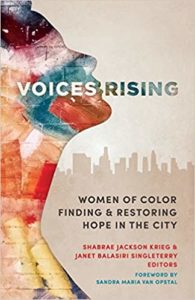 Voices Rising: Women of Color Finding & Restoring Hope in the City edited by Shabrae Jackson Krieg & Janet Balasiri Singleterry (Servant Partners) $15.95 How glad we were when a mail-order customer invited us to check out this classy small press that does books on urban ministry and related mission topics. We ordered most of their books right away and we are thrilled to show them off. This one is just spectacular, a must-read, just-have resource for anyone interested in urban renewal or world missions or the experience of women in Christian ministry.
Voices Rising: Women of Color Finding & Restoring Hope in the City edited by Shabrae Jackson Krieg & Janet Balasiri Singleterry (Servant Partners) $15.95 How glad we were when a mail-order customer invited us to check out this classy small press that does books on urban ministry and related mission topics. We ordered most of their books right away and we are thrilled to show them off. This one is just spectacular, a must-read, just-have resource for anyone interested in urban renewal or world missions or the experience of women in Christian ministry.
Voices Rising is a collection of chapters by various women of various cultures who are working among the worlds poorest, in slums and ghettos in big cities all over the world. For those who care about global missions or urban life, this puts you in those places and shares what it is like doing ministry in those hard, human, beautiful places.
Our friend Lisa Sharon Harper of the organization Freedom Road has a lovely blurb on the back and you can take it from her:
God has been at work in the hidden corners of the evangelical church; raising up evangelical women of color to enter the mission field again — for the sake of the preservation of the faith and the glory of God.
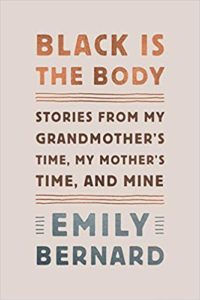 Black Is the Body: Stories From My Grandmother’s Time, My Mother’s Time, and Mine Emily Bernard (Knopf) $25.95 You are just going to have to look the other way at the time stamp or something because this book came out early (very early) in 2019, so it isn’t a Best Book of 2018. But it is so, so good I just can’t not list it here, now. As I look back at all the books I’ve read and those I’ve browsed and those I’ve skimmed and those I’ve studied, there are a lot, old and new. Black is the Body garnered excellent advanced reviews and she is known for being an elegant, important writer. (Her rich and dramatic first book on the Harlem Renaissance (and a cat named Carl Van Vechten) was called “a landmark study” and her Remember Me To Harlem was called by the eminent Henry Louis Gates “a major contribution to our understanding.” Bernard’s writing has been called scrupulous and magnificent.
Black Is the Body: Stories From My Grandmother’s Time, My Mother’s Time, and Mine Emily Bernard (Knopf) $25.95 You are just going to have to look the other way at the time stamp or something because this book came out early (very early) in 2019, so it isn’t a Best Book of 2018. But it is so, so good I just can’t not list it here, now. As I look back at all the books I’ve read and those I’ve browsed and those I’ve skimmed and those I’ve studied, there are a lot, old and new. Black is the Body garnered excellent advanced reviews and she is known for being an elegant, important writer. (Her rich and dramatic first book on the Harlem Renaissance (and a cat named Carl Van Vechten) was called “a landmark study” and her Remember Me To Harlem was called by the eminent Henry Louis Gates “a major contribution to our understanding.” Bernard’s writing has been called scrupulous and magnificent.
And so, Black is the Body is, I predict and surely hope, will be one of the most discussed literary books of 2019. It begins with an awful, riveting piece about her being knifed as a Yale college student in a Cambridge coffeeshop (I’m still so angry at the rude surgeon that I must catch myself) and her deciphering how she does and doesn’t weave the questions of race into this brutal narrative is nothing short of brilliant. I was hooked on the first page and raving by the end of the first chapter. As the dust jacket notes, “Bernard explores how that bizarre act of violence set her free and unleashed the storyteller in her.” She reminds us, vitally, that “the equation of writing and regeneration is fundamental to black American experience.”)
She is married to a white man and they live in Vermont, attending a Lutheran church. Her fascinating, precocious children often talk about their own skin color and race; oh, the parenting stuff is wonderful, tender and wise and honest. (It is surprising, perhaps, but I haven’t read much about families of color talking about the N-word with their little ones.) An episode with her husband driving with her parents in the south — the infamous Green Book is mentioned — was so eye-opening I wept. Yet, in each of these interlocking dozen essays/episodes, she moves beyond a simplistic narrative of black innocence and white guilt. “Each is anchored in a mystery; each sets out to discover a new way of telling the truth.”
There is one story she tells of teaching African American literature to an earnest group of all white college students. Oh my, this is rich, honest stuff.
“Not every black person here is black in the same way,” she notes.
Once my mother pointed to a Donna Summer album cover that featured the singer’s face surrounded by long curly locks, “You have hair like this girl,” my mother said. I burst into tears right there in the record store. I went back to bands and barrettes.
“What are you afraid of?” asked a friend of my parents, a professor at a local university, a black woman with short, natural hair. “Why do you bind your hair?” It was fellowship hour at our church. We were standing side by side, each of us holding identical Styrofoam cups. I held mind tighter and then looked for the first moment to excuse myself. She was right; I was afraid. I was not until college that I gathered courage to free my hair. Once I did, I shuddered to realize that what I had been afraid of was simply being black.
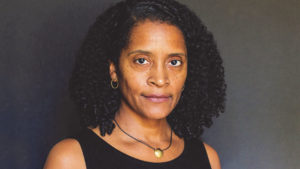
Ms Bernard knows black experience from her own body, of course, and has pondered these things and shared them with us in clear, solid prose. She knows black literature — citing Du Bois, Baldwin and Hurston — and is obviously a learned, thoughtful professor of English and a strong writer. Black is the Body includes stories we can all enjoy, by which we can be moved and taught, edified. We are glad for the many great books on theme about race and racial justice that were published in 2018. And for this one newly published early in 2019.
All books are on sale at 20% off the prices shown. We’ll deduct them when you order. Use our order form tabs below which take you to our secure order form page. Happy reading.
BookNotes

SPECIAL
DISCOUNT
+++
ANY BOOK MENTIONED
20% OFF
+++
order here
this takes you to the secure Hearts & Minds order form page
just tell us what you want
inquire here
if you have questions or need more information
just ask us what you want to know
Hearts & Minds 234 East Main Street Dallastown PA 17313
read@heartsandmindsbooks.com
717-246-3333
